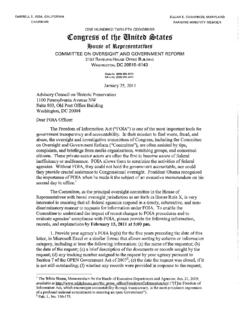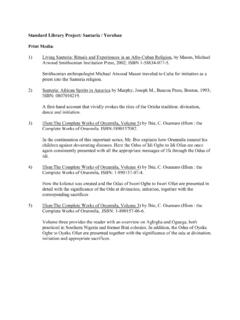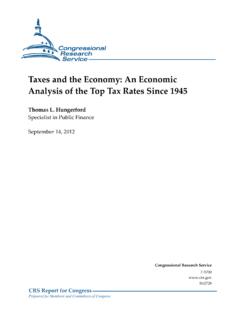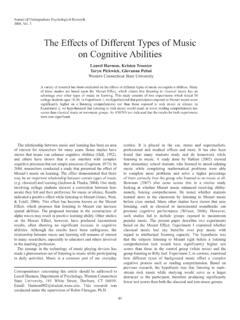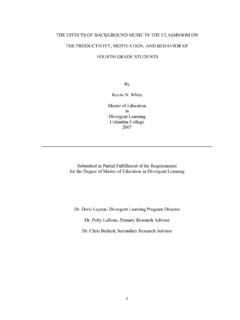Transcription of The Role of Deliberate Practice in the Acquisition of ...
1 Psychological Review 1993, Vol. 100. No. 3, 363-406 Copyright 1993 by the American Psychological Association, Inc. OO33-295X/93 The Role of Deliberate Practice in the Acquisition of Expert performance K. Anders Ericsson, Ralf Th. Krampe, and Clemens Tesch-Romer The theoretical framework presented in this article explains expert performance as the end result of individuals' prolonged efforts to improve performance while negotiating motivational and external constraints. In most domains of expertise, individuals begin in their childhood a regimen of effortful activities ( Deliberate Practice ) designed to optimize improvement.
2 Individual differences, even among elite performers, are closely related to assessed amounts of Deliberate Practice . Many characteristics once believed to reflect innate talent are actually the result of intense Practice extended for a minimum of 10 years. Analysis of expert performance provides unique evidence on the potential and limits of extreme environmental adaptation and learning. Our civilization has always recognized exceptional individ-uals, whose performance in sports, the arts, and science is vastly superior to that of the rest of the population.
3 Specula-tions on the causes of these individuals' extraordinary abilities and performance are as old as the first records of their achieve-ments. Early accounts commonly attribute these individuals' outstanding performance to divine intervention, such as the influence of the stars or organs in their bodies, or to special gifts (Murray, 1989). As science progressed, these explanations became less acceptable. Contemporary accounts assert that the characteristics responsible for exceptional performance are in-nate and are genetically transmitted.
4 The simplicity of these accounts is attractive, but more is needed. A truly scientific account of exceptional performance must completely describe both the development leading to ex-ceptional performance and the genetic and acquired character-istics that mediate it. This account must specify the critical differences between exceptional and ordinary performers. It must also show that any postulated genetic differences can be hereditary and are plausible from an evolutionary perspective.
5 Theoreticians in behavioral genetics (Plomin, DeFries, & McClearn, 1990) now argue that this is a very challenging task K. Anders Ericsson, Institute of Cognitive Science, University of Colorado at Boulder; Ralf Th. Krampe and Clemens Tesch-Romer, Max Planck Institute for Human Development and Education, Berlin, Federal Republic of Germany. The empirical research for this article was conducted at the Max Planck Institute for Human Development in Berlin. Research support by the Max Planck Society and support and encouragement from Paul Baltes are gratefully acknowledged.
6 We thank Peter Usinger and Stefanie Heizmann for their help in the data collection and Catherine Ashworth, Gregory Carey, Robert Crutcher, Janet Grassia, Reid Hastie, Stefanie Heizmann, Charles Judd, Ronald Kellogg, Robert Levin, Clayton Lewis, William Oliver, Peter Poison, Robert Rehder, Kurt Schlesinger, Vivian Schneider, and James Wilson for their valuable comments on earlier drafts of this article. Helpful suggestions and valuable criticism by Richard Shiffrin on previously submitted versions of this article are gratefully acknowl-edged.
7 Correspondence concerning this article should be sent to K. Anders Ericsson, who is now at the Department of Psychology R-54, Florida State University, Tallahassee, Florida 32306-1051. because observed behavior is the result of interactions between environmental factors and genes during the extended period of development. Therefore, to better understand expert and ex-ceptional performance , we must require that the account spec-ify the different environmental factors that could selectively promote and facilitate the achievement of such performance .
8 In addition, recent research on expert performance and expertise (Chi, Glaser, & Farr, 1988; Ericsson & Smith, 1991a) has shown that important characteristics of experts' superior performance are acquired through experience and that the effect of Practice on performance is larger than earlier believed possible. For this reason, an account of exceptional performance must specify the environmental circumstances, such as the duration and structure of activities, and necessary minimal biological attrib-utes that lead to the Acquisition of such characteristics and a corresponding level of performance .
9 An account that explains how a majority of individuals can attain a given level of expert performance might seem inher-ently unable to explain the exceptional performance of only a small number of individuals. However, if such an empirical account could be empirically supported, then the extreme characteristics of experts could be viewed as having been ac-quired through learning and adaptation, and studies of expert performance could provide unique insights into the possibili-ties and limits of change in cognitive capacities and bodily functions.
10 In this article we propose a theoretical framework that explains expert performance in terms of acquired charac-teristics resulting from extended Deliberate Practice and that limits the role of innate (inherited) characteristics to general levels of activity and emotionality. We provide empirical sup-port from two new studies and from already published evi-dence on expert performance in many different domains. Brief Historical Background Sir Francis Galton was the first scientist to investigate the possibility that excellence in diverse fields and domains has a common set of causes.

